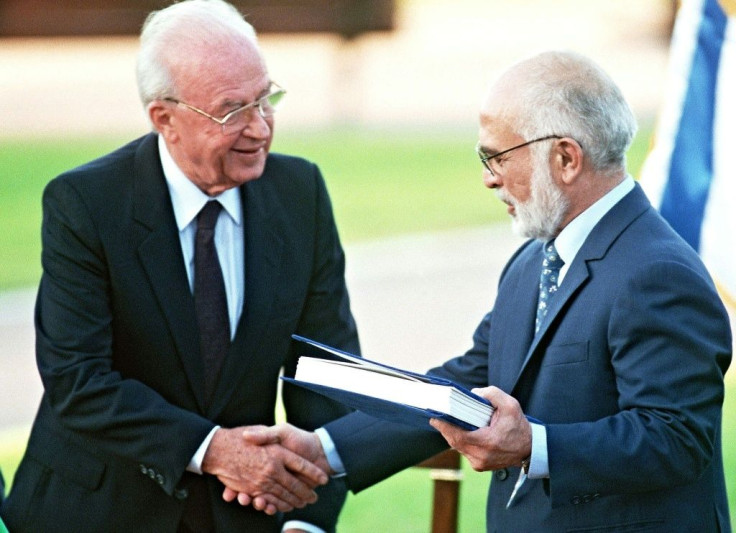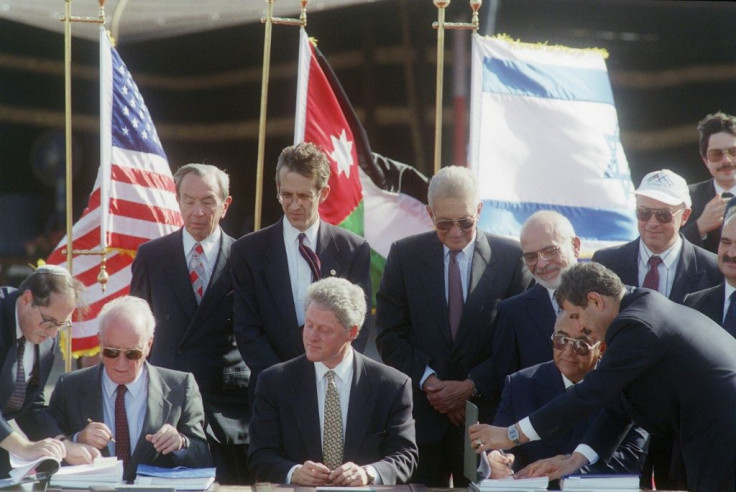Jordan's 25-year Peace With Israel 'Cold And Getting Colder'

Twenty-five years after the signing of a landmark peace treaty, ties between Jordan and Israel mirror the ebbs and flows of a turbulent region, while many Jordanians still regard the Jewish state as an "enemy".
The Wadi Araba Treaty, inked on 26 October 1994, formally ended decades of war between the two neighbours but the accord faces continual challenges, analysts say.
"Israel remains our number one enemy," Yazid Khleifat, a 38-year-old civil servant, told AFP.
"Israel has displaced millions of our Palestinian brothers and killed thousands of Arabs," he added.
More than half of Jordan's 9.5 million population is of Palestinian descent.
The largely desert Hashemite kingdom borders Israel and the occupied Palestinian territories where a decades-long conflict has defined the political tremors of the Middle East.
Jordan -- the only Arab country with Egypt to have a peace treaty with Israel -- administered the West Bank, including mostly Arab east Jerusalem, until the 1967 Six-Day War.
It remains the custodian of Muslim holy sites in Jerusalem.
"Despite the peace plan, Israel shows no respect for Jordan's custodianship over the holy sites... and its attempts to Judaise Jerusalem are in full swing," said Khleifat.
"The issue of custodianship is sensitive for the Hashemites because it touches upon their religious legitimacy," said Amman-based political analyst Labib Kamhawi.
Members of the Hashemite dynasty to which King Abdullah II belongs are direct descendants of the Prophet Mohammed.
'Enemy' of the people
King Abdullah II has repeatedly characterised the peace with Israel as "cold and getting colder" and warned that Jerusalem was a "red line".
The status of Jerusalem is one of the thorniest issues of the Israeli-Palestinian conflict.
Israel annexed the city after the 1967 war in a move never recognised by the international community.
In 2017, US President Donald Trump formally recognised the city as the capital of Israel, a move that angered the Palestinians who see the eastern sector of Jerusalem as the capital of their future state.
And in a further challenge, Prime Minister Benjamin Netanyahu, who heads the most right-wing government in Israel's history, has vowed to annex the Jordan Valley.
"Israel, with whom we signed a peace agreement 25 years ago, is not the same today," said Oraib Rantawi, director of Al Quds Centre for Political Studies.

"This is another Israel, ruled by an ultra-nationalist religious streak."
Kamhawi agrees.
"The average Jordanian does not accept Israel as a friend or ally but considers it an enemy who has violated Palestine and the holy sites," Kamhawi said.
Youssef Rashad, a 41-year-old who works in marketing, told AFP that Israel "does not really want peace".
"Jordan respects peace with Israel but Israel... does not want peace to begin with and has used the treaty as a cover to gain time and destroy any bid for a two-state solution" with the Palestinians, he added.
Washington, which is pushing for a so-called "deal of the century" plan to solve the Palestinian-Israeli conflict, has ignored the stalled two-state solution and the right of return for Palestinian refugees.
Jordan is home to 2.2 million Palestinian refugees registered with the United Nations.
'Ink on paper'
Several economic projects were struck between Jordan and Israel in the aftermath of the peace treaty but they have faltered, highlighting the rocky relations between the two neighbours.
These included the construction of a joint airport, a canal linking the Red Sea and the Dead Sea and an industrial zone.
"Most of these projects have remained ink on paper," said Rantawi.
Israel supplies water-parched Jordan with 50 million cubic meters of water a year as well as gas, while trade between the two countries is very modest.
And although more than 100,000 Israeli tourists visit Jordan each year, only 12,000 Jordanians travelled to Israel in 2018.
Security and intelligence cooperation, however, remains tightly intertwined.
Israeli ambassador Amir Weissbrod talked up the two sides' cooperation on security and water, and pointed out that Israeli visits to popular tourist sites in southern Jordan are increasing.
"We are trying to find ways to improve relations, both countries can do better," he told AFP. "Jordan is a reliable partner. We are reliable to each other."
But in a further sign of strains, King Abdullah last year announced plans to reclaim sovereignty over two small plots of territory -- Baqura and Ghumar -- leased to Israel under the 1994 peace treaty.
"For the first time, there is a signal from King Abdullah II that peace will be adversely affected by what is happening with the Palestinian issue," Rantawi said.
But Rantawi and Kamhawi also warned that the move, which has been welcomed by Jordanians as restoring the kingdom's "dignity", could spark more tensions between the two countries.
© Copyright AFP 2024. All rights reserved.





















